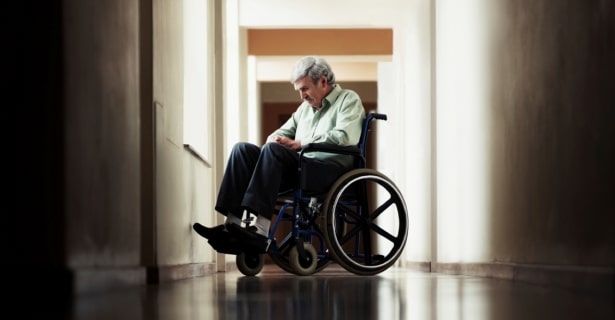 As more people are living longer, spending their final years in hospitals or nursing homes, the amount of claims of elder neglect has risen substantially. Many of these elderly people are not given adequate care to ensure comfort and quality of life in their remaining years. Elder neglect can cause pain and financial burden to elder patients, caregiver firms, as well as the loved ones of the elder victim of neglect.
As more people are living longer, spending their final years in hospitals or nursing homes, the amount of claims of elder neglect has risen substantially. Many of these elderly people are not given adequate care to ensure comfort and quality of life in their remaining years. Elder neglect can cause pain and financial burden to elder patients, caregiver firms, as well as the loved ones of the elder victim of neglect.
Depression and anger are common amongst caregivers of the elderly. If the caregiver seems particularly impatient or high-strung, it is possible that they are not equipped to provide adequate care for your loved one and could possibly neglect them in critical moments. In elder neglect cases, it is critical for family members and other loved ones to be actively involved in elder care and alert for any potential warning signs of neglect or abuse.
What Is Elder Neglect?
Elder neglect is the failure to provide adequate care to an elderly person who has been placed in the charge of some sort of a caretaker. This failure can be deliberate or an act of negligence. Often times, this form of abuse is suffered at the hands of professional caretakers. However, elder neglect is not limited to only nursing homes, hospitals, and other care facilities. Elder neglect can also be perpetrated by family members or acquaintances of the elderly person. Motivations for such behavior could include stress and financial incentives.
Examples of Elder Neglect
Elder neglect does not strictly refer to a lack of attention to the needs of an elderly person. Elder neglect can also be not meeting the physical, emotional, or intellectual needs of an elderly person. Many cases of elder neglect have the potential to be confused with the natural deterioration of an elderly person.
Examples of elder neglect include, but are not limited to:
- Failure to provide medication within appropriate dosage or timeframe.
- Leaving the patient alone for prolonged periods of time.
- Failure to meet the physical and emotional needs of the patient.
- Failure to maintain proper standards of care or proper professional conduct.
Signs of Elder Neglect
There are several warning signs associated with elder neglect. More obvious signs include deteriorating physical health and intellectual and emotional vigor Less over signs may include unsanitary living conditions and prolonged periods of solitude are also telltale signs of elder neglect. Potential indications of elder neglect may also be detected in the caregivers themselves.
Potential warning signs of elder neglect may include:
- Unsanitary living conditions
- Deterioration of patient
- Visible stress of the caregiver
- Visible stress of the patient
Problems Associated with Elder Neglect
Besides the betrayal of the patient/provider trust, other problems associated with elder neglect are:
- Physical and emotional damages to the patient
- Financial harm to the patient
- Emotional and financial harm to the loved ones of the victim
- Deterioration of the respect to the caregiver profession
Finding an Elder Neglect Lawyer in Orlando
If you think that your elderly loved one might be a victim of neglect, acting in a timely manner is imperative. Many times, these victims cannot speak up for themselves. Thus, negligent caregivers are allowed to continue working. There are also many attorneys who specialize in elder neglect cases. The experience and resources of these firms are a valuable tool for determining whether or not your loved one has been a victim of elder neglect and what you can do to seek justice.
Additional Resources
There are a number of resources to help loved ones who suspect elder abuse. These resources are also available to elder abuse victims who may be wary of asking caregivers or facilities for help. These organizations can provide guidance and advice for getting help and keeping elders safe.
National Academy of Elder Law Attorneys
For resources regarding elder neglect, the National Academy of Elder Law Attorneys is made up of judges, attorneys, and law students as an advocacy group to advance the education in elderly law. While they do not offer attorney referral services, they provide access to numerous resources that will help you make informed decisions regarding your specific case.
National Center on Elder Abuse
The Department of Health and Human Services sponsors the National Center on Elder Abuse which provides support for victims and families of victims of elder neglect and abuse. The NCEA provides resources for you to get help for your loved ones and report elder neglect.
Sources:
“National Center on Elder Abuse.” National Center on Elder Abuse. Department of Health and Human Services. Web. 1 Nov. 2014.
Glendenning, Frank. “Elder Abuse and Neglect in Residential Settings: The Need for Inclusiveness in Elder Abuse Research.” Journal of Elder Abuse & Neglect: 1-11. Web. 1 Nov. 2014.
Stiegel, Lori. “Recommendations for the Elder Abuse, Health, and Justice Fields About Medical Forensic Issues Related to Elder Abuse and Neglect.” Journal of Elder Abuse & Neglect: 41-81. Web. 1 Nov. 2014.
